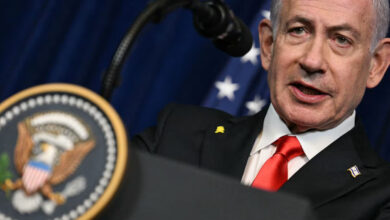It was a small moment, but a potentially defining one.
On 28 January, President Barack Obama stood before a “town hall meeting” of Florida college students—the sort of intimate populist gathering where the charismatic Obama normally flourishes.
A young student named Laila Abdel Aziz took the microphone, giggling under the sudden spotlight and prefacing her question by saying she had volunteered during Obama’s campaign.
Then she asked a question on the minds of many in the Middle East: “Last night in your State of the Union address you spoke of America’s support for human rights. Then, why have we not condemned Israel and Egypt’s human rights violations against the occupied Palestinian people? And yet we continue supporting them financially with billions of dollars from our tax dollars?"
Obama’s response might as well have been assembled with random sentences from every US government statement on Israel/Palestine over the past 30 years.
He called Israel “one of our strongest allies” and “a vibrant democracy,” acknowledged “the plight of the Palestinians,” endorsed the two-state solution and concluded that, “both sides are going to have to make compromises.”
Afterwards, in an interview with a local Florida radio station, Abdel Aziz couldn’t hold back from criticizing a man she helped get elected.
“President Obama did not really answer my question or address it, so I’m really disappointed right now."
She’s hardly alone.
As Obama enters the second year of his historic presidency, many in the Arab and Muslim world seem increasingly unhappy about how little hope and change we’ve actually seen. The much-vaunted US-backed push to restart Israeli-Palestinian peace talks has essentially stalled while efforts to push for greater domestic reform among America’s Arab allies never really got started in the first place.
“Part of the problem is that many Arabs, including even some Islamists, believed in Obama almost as much as Americans did,” wrote Shadi Hamid, deputy director of the Brookings Doha Center, a branch of the Washington DC-based Brookings Institute thinktank. “The gap between expectation and reality has been so great so as to almost defy characterization.”
In fairness, expectations for the impact Obama would have in the Middle East were probably a little over-inflated. But after all, wasn’t it Obama himself that did much of the inflating in the first place?
Obama acknowledged as much in an interview earlier this week with Time magazine.
“I think it is absolutely true that what we did this year didn’t produce the kind of breakthrough that we wanted,” Obama said of peace process. “If we had anticipated some of these political problems of both sides earlier, we might not have raised expectations so high.”
With his landmark speech in Cairo six months ago and his tough talk about a need for an absolute blanket freeze on Israeli settlement construction, Obama’s administration started strong.
Then something changed. Or perhaps it’s more accurate to say that nothing changed. Israeli Prime Minister Benjamin Netanyahu essentially called the administration’s bluff. His offer last fall of a temporary freeze on West Bank settlement construction, while continuing to build in Arab East Jerusalem, fell far short of the Obama administration’s stated minimum requirements.
America’s counter-response was all-too-familiar to jaded observers of the Middle East political swamp: vague talk about how Israel’s continued construction was “unhelpful,” followed by pressure on Palestinian Authority President Mahmoud Abbas to accept negotiations on terms that would kill his already fragile credibility.
The end result has been the same exact stalemate that killed all the previous incarnations of the peace process. It’s a scenario that critics of the administration say they should have seen coming.
“It’s not as if the dysfunctional condition of Israeli and Palestinian internal politics was a dark mystery when Obama took office,” wrote Harvard University professor Stephen Walt recently on the Foreign Policy Magazine website. “Did they ever ask themselves what they would do if Netanyahu dug in his heels, as anyone with a triple-digit IQ should have expected?”
Walt, one of the most high-profile critics of Israeli policy, has begun openly urging U.S. Middle East Envoy Sen. George Mitchell to resign.
“He is wasting his time. The administration’s early commitment to an Israeli-Palestinian peace was either a naïve bit of bravado or a cynical charade, and if Mitchell continues to pile up frequent-flyer miles in a fruitless effort, he will be remembered as one of a long series of US ‘mediators’ who ended up complicit in Israel’s self-destructive land grab on the West Bank,” Walt wrote.
On Arab domestic issues, the situation has been even worse. While the Obama administration can be accused of paying insincere lip service to Israeli-Palestinian peace, the need for democratic reform hasn’t even received the lip service. Obama made brief mention of the issue in his Cairo speech, but since then has contributed almost nothing significant.
“Arab reformers, who for most of this decade have been trying to break down the barriers to social and political modernization in the Middle East, have also begun to conclude that the Obama administration is more likely to harm than to help them,” wrote Washington Post columnist Jackson Diehl, a longtime critic of the Mubarak regime. “The Obama administration…often speaks as if it does not recognize the existence of an Arab reform movement.”
Some think there’s still a lot of time left for Obama to fulfill some of those hopes. But at the one-year mark, the honeymoon is definitely over and the signs simply don’t look very good.
Obama doesn’t sound worse than previous administrations. He sounds exactly the same—and that’s the problem.




